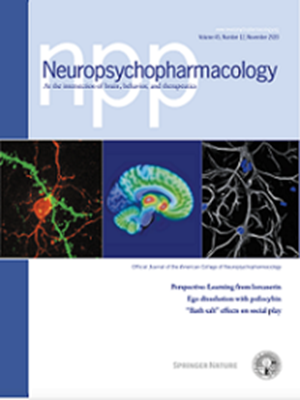脑和心血管对缓解和复发的老年抑郁症急性应激的反应。
IF 6.6
1区 医学
Q1 NEUROSCIENCES
引用次数: 0
摘要
在晚年抑郁症(LLD)得到缓解的个体中,压力暴露可增加新的复发性抑郁症发作的可能性。应激对复发风险影响的可变性可能反映了介导应激反应的潜在大脑和生理过程。我们研究了有和没有抑郁症缓解的老年人对实验性压力源的主观、生理和大脑反应的差异,以及这些压力反应与未来复发的关系。参与者通过3个站点招募,包括76名LLD缓解的老年人和36名年龄匹配的健康对照(HC)成年人。参与者在行为和心血管监测的功能脑成像期间完成了急性应激源任务。缓解LLD参与者进行纵向随访以评估抑郁复发。与HC相比,LLD缓解组表现出压力诱发的收缩压和心率反应降低,以及压力诱发的后岛活动减少。与复发性LLD组相比,这种钝化的应激反应表型在稳定的LLD组中更为特异。生存分析表明,应激诱发床终纹核(BNST)活性越高,复发时间越短。这些发现增加了越来越多的文献报道所谓的“钝化”压力诱发的心血管和大脑反应在缓解抑郁症。此外,他们将内脏内感受性脑回路中的应激反应与复发易感性联系起来。未来的工作涉及更长的随访期,可能会揭示缓解LLD复发的其他与压力相关的大脑和行为预测因素。本文章由计算机程序翻译,如有差异,请以英文原文为准。

Brain and cardiovascular responses to acute stress in remitted and recurrent late-life depression
In individuals with remitted late-life depression (LLD), stress exposure can increase the likelihood of a new, recurrent depressive episode. Variability in the effect of stress on recurrence risk may reflect underlying brain and physiological processes mediating the stress response. We examined how subjective, physiological, and brain responses to an experimental stressor differs in older adults with and without remitted depression, and how these stress responses relate to future relapse. Participants were recruited through 3 sites and included 76 older adults with remitted LLD and 36 age-matched healthy comparison (HC) adults. Participants completed an acute stressor task during functional brain imaging with behavioral and cardiovascular monitoring. Remitted LLD participants were followed longitudinally to evaluate depression recurrence. Compared to HC, the remitted LLD group exhibited reduced stressor-evoked systolic blood pressure and heart rate responses, as well as reduced stressor-evoked posterior insula activity. This blunted stress response phenotype appeared more specific to the stable remitter group than the relapsing LLD group. Survival analyses demonstrated that greater stressor-evoked bed nucleus of the stria terminalis (BNST) activity was associated with faster time to recurrence. These findings add to a growing literature reporting so-called “blunted” stressor-evoked cardiovascular and brain reactivity in remitted depression. Moreover, they link the stress response in visceral interoceptive brain circuits with relapse vulnerability. Future work involving longer follow-up periods may reveal additional stress-related brain and behavioral predictors of recurrence in remitted LLD.
求助全文
通过发布文献求助,成功后即可免费获取论文全文。
去求助
来源期刊

Neuropsychopharmacology
医学-精神病学
CiteScore
15.00
自引率
2.60%
发文量
240
审稿时长
2 months
期刊介绍:
Neuropsychopharmacology is a reputable international scientific journal that serves as the official publication of the American College of Neuropsychopharmacology (ACNP). The journal's primary focus is on research that enhances our knowledge of the brain and behavior, with a particular emphasis on the molecular, cellular, physiological, and psychological aspects of substances that affect the central nervous system (CNS). It also aims to identify new molecular targets for the development of future drugs.
The journal prioritizes original research reports, but it also welcomes mini-reviews and perspectives, which are often solicited by the editorial office. These types of articles provide valuable insights and syntheses of current research trends and future directions in the field of neuroscience and pharmacology.
 求助内容:
求助内容: 应助结果提醒方式:
应助结果提醒方式:


